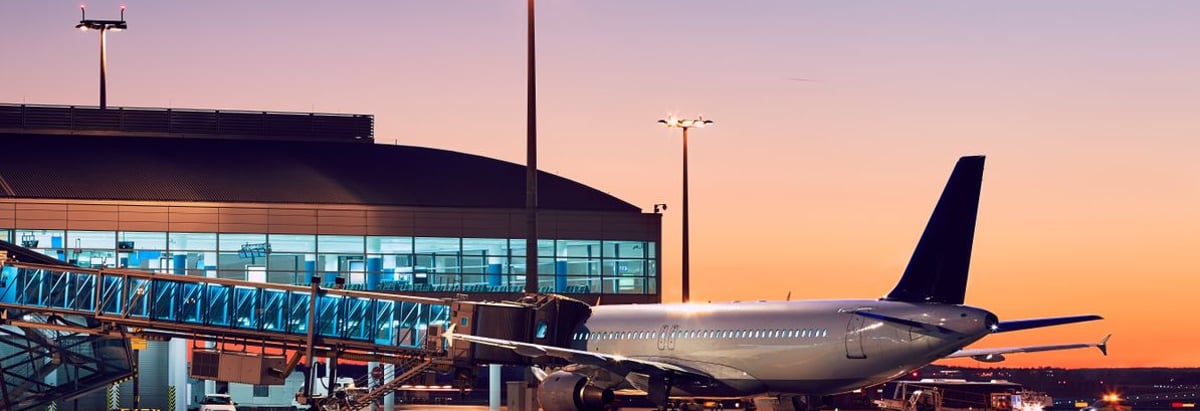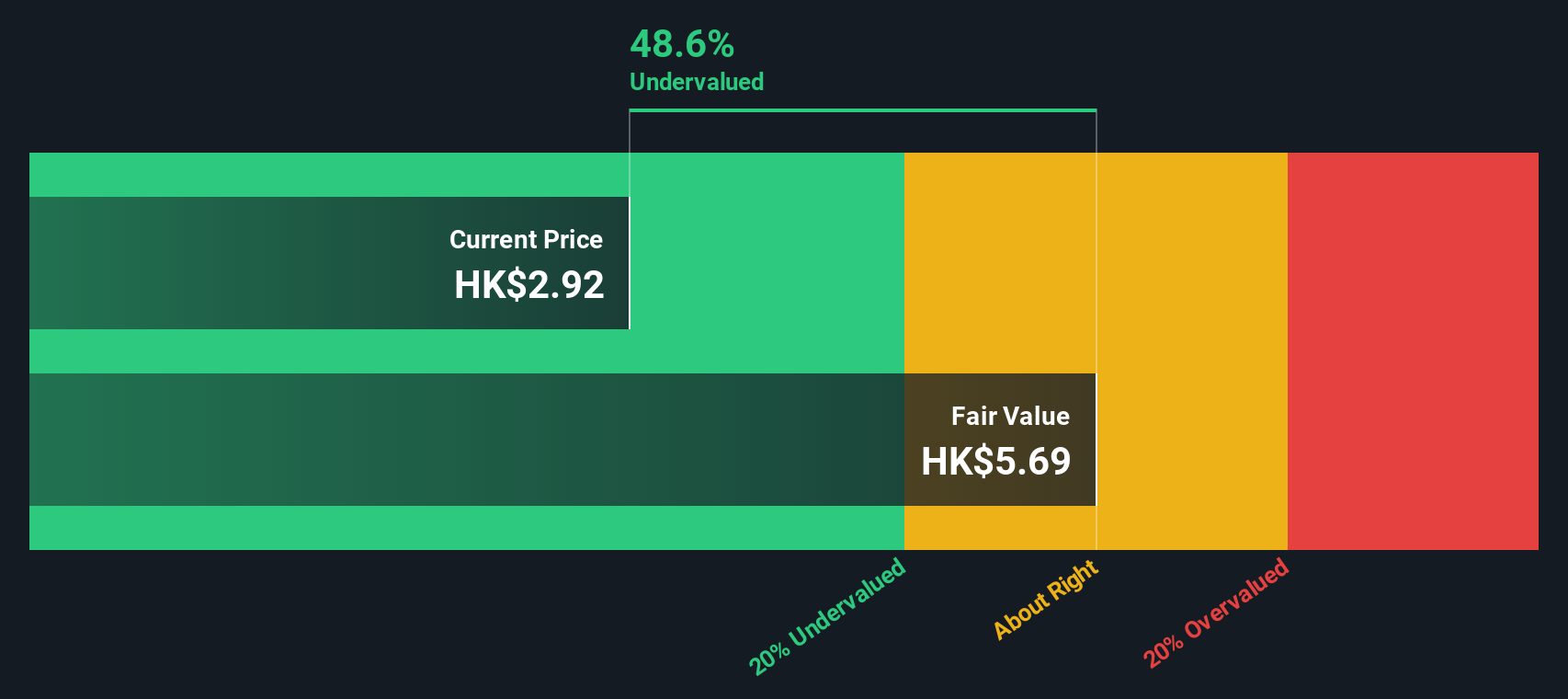- Hong Kong
- /
- Infrastructure
- /
- SEHK:694
Are Investors Undervaluing Beijing Capital International Airport Company Limited (HKG:694) By 49%?

Key Insights
- Using the 2 Stage Free Cash Flow to Equity, Beijing Capital International Airport fair value estimate is HK$5.69
- Beijing Capital International Airport's HK$2.92 share price signals that it might be 49% undervalued
- Our fair value estimate is 86% higher than Beijing Capital International Airport's analyst price target of CN¥3.06
Today we'll do a simple run through of a valuation method used to estimate the attractiveness of Beijing Capital International Airport Company Limited (HKG:694) as an investment opportunity by taking the forecast future cash flows of the company and discounting them back to today's value. Our analysis will employ the Discounted Cash Flow (DCF) model. Believe it or not, it's not too difficult to follow, as you'll see from our example!
Remember though, that there are many ways to estimate a company's value, and a DCF is just one method. Anyone interested in learning a bit more about intrinsic value should have a read of the Simply Wall St analysis model.
What's The Estimated Valuation?
We are going to use a two-stage DCF model, which, as the name states, takes into account two stages of growth. The first stage is generally a higher growth period which levels off heading towards the terminal value, captured in the second 'steady growth' period. To start off with, we need to estimate the next ten years of cash flows. Where possible we use analyst estimates, but when these aren't available we extrapolate the previous free cash flow (FCF) from the last estimate or reported value. We assume companies with shrinking free cash flow will slow their rate of shrinkage, and that companies with growing free cash flow will see their growth rate slow, over this period. We do this to reflect that growth tends to slow more in the early years than it does in later years.
Generally we assume that a dollar today is more valuable than a dollar in the future, and so the sum of these future cash flows is then discounted to today's value:
10-year free cash flow (FCF) estimate
| 2025 | 2026 | 2027 | 2028 | 2029 | 2030 | 2031 | 2032 | 2033 | 2034 | |
| Levered FCF (CN¥, Millions) | CN¥1.43b | CN¥1.39b | CN¥1.70b | CN¥1.93b | CN¥2.12b | CN¥2.29b | CN¥2.44b | CN¥2.56b | CN¥2.67b | CN¥2.78b |
| Growth Rate Estimate Source | Analyst x1 | Analyst x2 | Analyst x1 | Est @ 13.45% | Est @ 10.19% | Est @ 7.91% | Est @ 6.31% | Est @ 5.20% | Est @ 4.41% | Est @ 3.87% |
| Present Value (CN¥, Millions) Discounted @ 11% | CN¥1.3k | CN¥1.1k | CN¥1.2k | CN¥1.3k | CN¥1.3k | CN¥1.2k | CN¥1.2k | CN¥1.1k | CN¥1.0k | CN¥982 |
("Est" = FCF growth rate estimated by Simply Wall St)
Present Value of 10-year Cash Flow (PVCF) = CN¥12b
We now need to calculate the Terminal Value, which accounts for all the future cash flows after this ten year period. For a number of reasons a very conservative growth rate is used that cannot exceed that of a country's GDP growth. In this case we have used the 5-year average of the 10-year government bond yield (2.6%) to estimate future growth. In the same way as with the 10-year 'growth' period, we discount future cash flows to today's value, using a cost of equity of 11%.
Terminal Value (TV)= FCF2034 × (1 + g) ÷ (r – g) = CN¥2.8b× (1 + 2.6%) ÷ (11%– 2.6%) = CN¥34b
Present Value of Terminal Value (PVTV)= TV / (1 + r)10= CN¥34b÷ ( 1 + 11%)10= CN¥12b
The total value is the sum of cash flows for the next ten years plus the discounted terminal value, which results in the Total Equity Value, which in this case is CN¥24b. In the final step we divide the equity value by the number of shares outstanding. Relative to the current share price of HK$2.9, the company appears quite undervalued at a 49% discount to where the stock price trades currently. Remember though, that this is just an approximate valuation, and like any complex formula - garbage in, garbage out.

Important Assumptions
The calculation above is very dependent on two assumptions. The first is the discount rate and the other is the cash flows. You don't have to agree with these inputs, I recommend redoing the calculations yourself and playing with them. The DCF also does not consider the possible cyclicality of an industry, or a company's future capital requirements, so it does not give a full picture of a company's potential performance. Given that we are looking at Beijing Capital International Airport as potential shareholders, the cost of equity is used as the discount rate, rather than the cost of capital (or weighted average cost of capital, WACC) which accounts for debt. In this calculation we've used 11%, which is based on a levered beta of 1.588. Beta is a measure of a stock's volatility, compared to the market as a whole. We get our beta from the industry average beta of globally comparable companies, with an imposed limit between 0.8 and 2.0, which is a reasonable range for a stable business.
View our latest analysis for Beijing Capital International Airport
Looking Ahead:
Whilst important, the DCF calculation is only one of many factors that you need to assess for a company. DCF models are not the be-all and end-all of investment valuation. Preferably you'd apply different cases and assumptions and see how they would impact the company's valuation. If a company grows at a different rate, or if its cost of equity or risk free rate changes sharply, the output can look very different. Why is the intrinsic value higher than the current share price? For Beijing Capital International Airport, we've put together three pertinent aspects you should explore:
- Risks: To that end, you should be aware of the 1 warning sign we've spotted with Beijing Capital International Airport .
- Future Earnings: How does 694's growth rate compare to its peers and the wider market? Dig deeper into the analyst consensus number for the upcoming years by interacting with our free analyst growth expectation chart.
- Other Solid Businesses: Low debt, high returns on equity and good past performance are fundamental to a strong business. Why not explore our interactive list of stocks with solid business fundamentals to see if there are other companies you may not have considered!
PS. The Simply Wall St app conducts a discounted cash flow valuation for every stock on the SEHK every day. If you want to find the calculation for other stocks just search here.
Valuation is complex, but we're here to simplify it.
Discover if Beijing Capital International Airport might be undervalued or overvalued with our detailed analysis, featuring fair value estimates, potential risks, dividends, insider trades, and its financial condition.
Access Free AnalysisHave feedback on this article? Concerned about the content? Get in touch with us directly. Alternatively, email editorial-team (at) simplywallst.com.
This article by Simply Wall St is general in nature. We provide commentary based on historical data and analyst forecasts only using an unbiased methodology and our articles are not intended to be financial advice. It does not constitute a recommendation to buy or sell any stock, and does not take account of your objectives, or your financial situation. We aim to bring you long-term focused analysis driven by fundamental data. Note that our analysis may not factor in the latest price-sensitive company announcements or qualitative material. Simply Wall St has no position in any stocks mentioned.
About SEHK:694
Beijing Capital International Airport
Operates and manages aeronautical and non-aeronautical businesses at the Beijing Capital Airport in the People’s Republic of China.
Reasonable growth potential and slightly overvalued.
Similar Companies
Market Insights
Community Narratives


